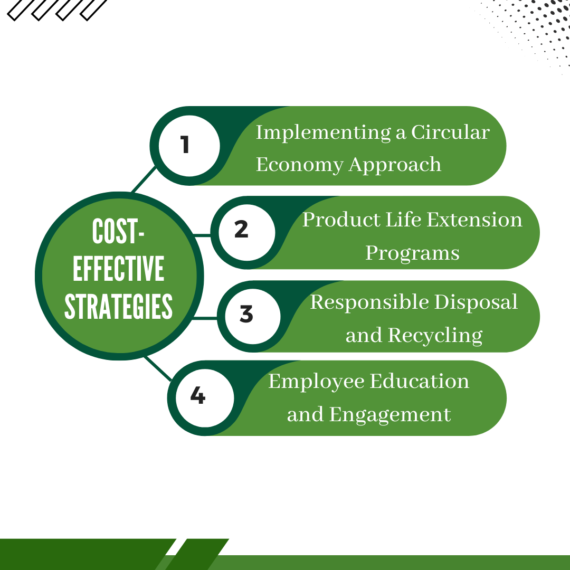
Cost-Effective Strategies For Businesses To Manage Their E-Waste
In today’s tech-driven world, businesses constantly generate electronic waste – discarded computers, phones, printers, and other devices. There is no doubt electronic devices are essential for progress in the digital age. Still, proper disposal and recycling of e-waste are crucial to mitigate the negative impact of e-waste on our planet’s ecosystems and human health, as it poses a significant environmental threat due to the availability of hazardous materials such as lead, mercury, and cadmium. Here, we explore innovative and cost-effective strategies businesses can implement:
Let’s find out the cost-effective Strategies For Businesses To Manage E-waste:

Implementing a Circular Economy Approach:
• In a circular economy, businesses strive to reduce waste and extend product lifespan through durable, repairable, and recyclable designs.
• This method involves using materials that can be easily taken apart and recycled when a product reaches the end of its life cycle, thus reducing the amount of e-waste generated.
• Businesses can also explore innovative design concepts such as modular construction, where components can be easily replaced or upgraded, extending the useful life of electronic devices.
Product Life Extension Programs:
• Product life extension programs focus on prolonging the usability of electronic devices through repair, refurbishment, and upgrades.
• Businesses can offer repair services either in-house or through partnerships with authorized repair centers, providing customers with affordable options to fix their devices instead of discarding them.
• Providing access to genuine spare parts and offering software updates to enhance device performance can also contribute to extending the lifespan of products.
Responsible Disposal and Recycling:
• Responsible disposal involves ensuring that end-of-life electronic devices are recycled or disposed of in an environmentally friendly manner.
• Businesses should partner with certified e-waste recycling facilities that adhere to proper disposal and recycling practices, minimizing the environmental impact of discarded electronics.
• Establishing take-back programs allows customers to return old devices for recycling, making it convenient and accessible for them to dispose of e-waste responsibly.
Employee Education and Engagement:
• Educating employees about the importance of e-waste management and sustainability practices is crucial for fostering a culture of environmental responsibility within the workplace.
• Training programs can include information on proper disposal procedures, the benefits of recycling, and ways to reduce e-waste generation.
• Engaging employees through awareness campaigns and incentive programs can encourage them to adopt eco-friendly practices at work and in their personal lives.
Integration of Reverse Logistics:
• Reverse logistics involves the process of collecting, transporting, and managing returned or end-of-life products.
• Businesses can streamline the return and recycling process by integrating reverse logistics into their supply chain management systems.
• This may include establishing efficient collection points for customers to return old devices, optimizing transportation routes for e-waste collection, and coordinating with recycling partners for proper disposal.
Leveraging Technology for Tracking and Reporting:
• Technology solutions such as tracking systems and reporting tools enable businesses to monitor and measure their e-waste management efforts.
• Tracking systems can offer real-time visibility into the movement of e-waste within the supply chain, allowing businesses to recognize areas for improvement and ensure compliance with regulations.
• Reporting tools generate valuable data and metrics that can be used to examine the effectiveness of e-waste management initiatives and inform future sustainability strategies.
Collaboration and Partnerships:
• Collaboration with industry peers, government agencies, and non-profit organizations can amplify the impact of e-waste management efforts.
• Businesses can participate in industry-wide initiatives and share best practices for sustainable e-waste management.
• Partnerships with government agencies and non-profit organizations may provide access to resources, funding, and expertise to support electronic waste reduction and recycling initiatives.
Incentivizing Eco-Friendly Practices:
• Providing incentives such as rewards & discounts for customers who return old devices for recycling encourages responsible behavior and promotes a circular economy.
• Employee recognition programs that reward individuals or teams for implementing innovative electronic waste reduction initiatives can foster a culture of sustainability within the organization.
• Incentives can also include tax incentives or subsidies for businesses that invest in e-waste management infrastructure or participate in recycling programs.
Final Say!
Effective e-waste management is a crucial aspect of sustainable business practices. By implementing these innovative and cost-effective strategies, businesses can effectively manage their electronic waste, contribute to a more sustainable future, and unlock financial benefits through responsible resource recovery. Remember, responsible e-waste management demonstrates your commitment to corporate social responsibility and ethical business practices.
Read Our More Blogs:
5 Effective Ways to Extend the Life of Your Electronics
E-waste Recycling Do’s and Don’ts: A Quick Guide
Follow us:







